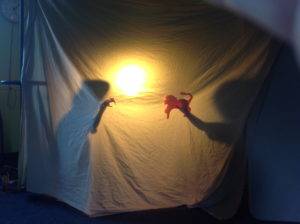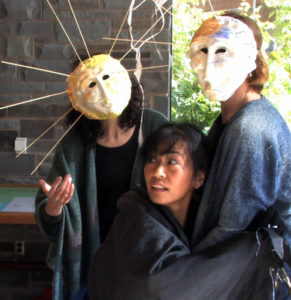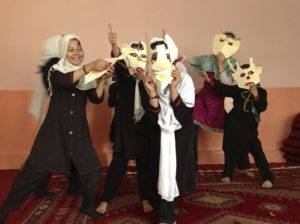 These past weeks have held plentiful reminders of the horrendous things we do to each other as people and societies. In the face of large darknesses, we often forget that ignorance and intolerance are bred and cultivated in much smaller arenas long before they grow into mass malignancy. I myself have found it difficult to find anything to write about of late, and I am one of the most pragmatically action-oriented people I know.
These past weeks have held plentiful reminders of the horrendous things we do to each other as people and societies. In the face of large darknesses, we often forget that ignorance and intolerance are bred and cultivated in much smaller arenas long before they grow into mass malignancy. I myself have found it difficult to find anything to write about of late, and I am one of the most pragmatically action-oriented people I know.
With this in mind, I have decided to devote this blog and the next to arts-based projects that are creating opportunities for connection and knowledge. The texts about the three projects are directly from the blog articles themselves, and the title is linked to the original. Here’s an added bonus– you can become involved in these yourself, in one way or another!
Women Artists and Wikipedia
“Many women’s arts organizations have worked to increase the visibility of women artists online.
WomenArts created our online directory of women artists, the Women Arts Network, in 2003 because we wanted to encourage women to increase their presence on the web. Any woman artist can create a free profile page on our site, and we currently have about 1,600 active profiles. We have also compiled a list of other directories of women artists. If you know of a directory that should be added to our list, please contact us.
It is important to keep adding information to our women-controlled websites, since Wikipedia has rules and a culture that will be challenging for some women artists, but we agree with the founders of Art + Feminism that we need to make sure that women artists are fully represented in this online encyclopedia that so many people are using.
Documenting women artists worldwide in all art forms is a huge task that will require input from thousands of women, but it is something that all of us can work on – either on our own or in groups. If you are looking for something to do with your friends this year on SWAN Day, this could be a great choice. If you are a teacher, this could be a great project for your students.
Art + Feminism has created some excellent Wikipedia articles to help you get started. There is an article about how to organize an edit-a-thon MeetUp group, and their own Wikipedia Meet-Up page has links to upcoming events and helpful articles about creating and editing Wikipedia listings.”

World Theatre for Children and Young People
This is from a Huffington Post blogpost by Lauren Gunderson. “Not to sound overly grand (too late), but so much of the toxicity in this world comes from a collective draining of empathy. We don’t understand each other, and we don’t want to. But theater invites us — no, forces us — to empathize.
As my friend Bill English of San Francisco’s SF Playhouse says, theater is like a gym for empathy. It’s where we can go to build up the muscles of compassion, to practice listening and understanding and engaging with people that are not just like ourselves. We practice sitting down, paying attention and learning from other people’s actions. We practice caring.
Kids need this kind of practice even more than adults do. This is going to be their planet and they’ve got more time to apply that empathy and make a difference. Buddhist roshi Joan Halifax challenges us to actively and specifically teach children (and vote for presidents with) empathy. Why not take your child to the theater to do just that.”
“Your Fatwa Does Not Apply Here”
This is Holly again, speaking about this book that shares with us the incredible work of artists and performers of Muslim faith striving against the oppressions of fundamentalism. I first became aware of this amazing book and the work of some of the people profiled in it when I read a published excerpt in Theatre Without Borders newsletter. I quote from the book’s description on Amazon: “From Karachi to Tunis, Kabul to Tehran, across the Middle East, North Africa, South Asia, and beyond, these trailblazers often risked death to combat the rising tide of fundamentalism within their own countries.
But this global community of writers, artists, doctors, musicians, museum curators, lawyers, activists, and educators of Muslim heritage remains largely invisible, lost amid the heated coverage of Islamist terror attacks on one side and abuses perpetrated against suspected terrorists on the other.” 
So there it is. Read the book, or add Women Artists, or support incredible theatre for children — it is with these small actions that we change the shape of a landscape or the course of a river.